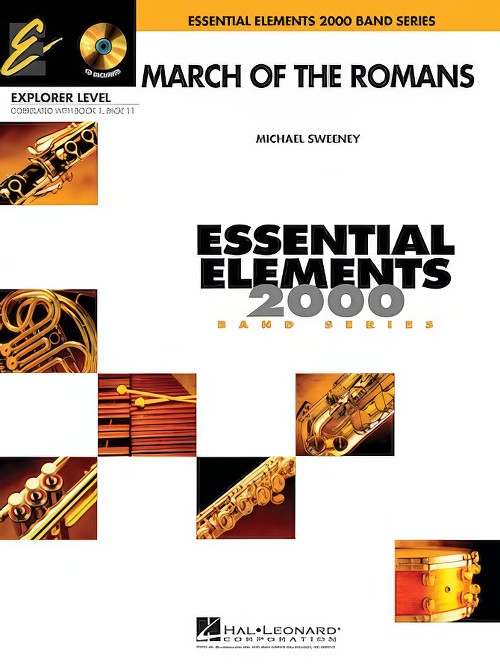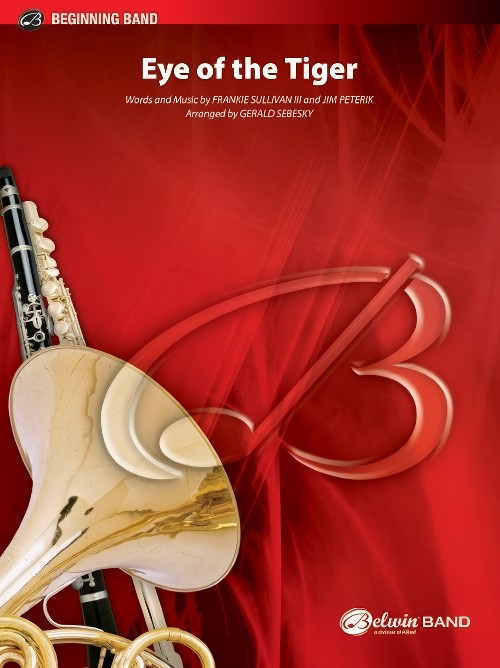Results
-
 £38.50
£38.50March of the Romans (Concert Band - Score and Parts) - Sweeney, Michael
It's hard to believe that this impressive piece for beginners uses nothing faster than quarter notes (a few 8th notes in percussion)! Michael cleverly uses the sound of stomping feet and bold harmonies creating an effect that sounds harder than it really is.
Estimated dispatch 7-14 working days
-
£70.99
The Sound Of Silence
Estimated dispatch 10-14 working days
-
 £90.30
£90.30A Sound of Wesley - Cor Kee
Estimated dispatch 7-14 working days
-
£128.80
The Sound Of Crime - Stefan Schwalgin
Estimated dispatch 7-14 working days
-
 £82.80
£82.80The Sound Of Silence - Paul Simon
Estimated dispatch 7-14 working days
-
£67.50
Song of the Matador - Douglas Court
The unmistakable sound of Spain! You can almost taste the red dust in the air! Douglas Court's SONG OF THE MATADOR will add a wonderful exotic touch to your next performance. Great melodic exposure for the Trombones, Tubas and other low Brass and Woodwinds, as well as lots of wonderful dynamic and articulation considerations, make this a terrific teaching tool as well!The fiery nature of this music is naturally contained in a moderate tempo so that the piece remains accessible to young bands.
Estimated dispatch 7-14 working days
-
£64.99
Adventure Tale of Neverland - Daisuke Shimizu
Commissioned by the Rave Group Int'l and Hong Kong Band Directors' Association for the 7th Winter Band Festival 2015, this piece was completed in August of the same year. Ten years before I wrote "Adventure Tale of Professor Alex"(Brain/Bravo Music), setting the exploits of this imaginary character to music. From the same series now comes "Adventure Tale of Neverland" depicting fantasy adventures of the famed Peter Pan.The piece begins quietly with sound of the Great Bell of Big Ben, after which the main theme is introduced. As with the preceding work, please enjoy imagining Peter Pan's adventures to produce a spectacular musical voyage.
Estimated dispatch 7-14 working days
-
 £55.50
£55.50Eye of the Tiger (Concert Band - Score and Parts) - Peterik & Sullivan - Sebesky, Gerald
The sound of the ringside bell announces yet another showing of one of the great Rocky films. Here is the theme music from Rocky III, originally recorded by the group Survivor and recognized worldwide. Here is an arrangement for your youngest ensemble that will not create problems with technique, allowing for pure enjoyment of music made famous in the movies! Duration: 1.45
Estimated dispatch 7-14 working days
-
 £139.99
£139.99Spirit of Independence - Jan Van der Roost
'Spirit of Independence' was commissioned by the Koninklijke Fanfare 'Onafhankelijkheid' ('Independence') from Wiekevorst (Belgium) on the occasion of its 25th anniversary. The piece depicts an enthusiastic amateur music club, practicing and making music together in an attentive and companionable atmosphere. The conductor has the good habit of trying to improve the sound of the fanfare by means of practicing chorales and hymns. Jan Van der Roost has used these facts in the dynamic concert piece 'Spirit of Independence': a chorale-like middle section is surrounded by music bubbling full of energy.
Estimated dispatch 7-14 working days
-
 £76.99
£76.99Music from Braveheart - James Horner
The music from this Oscar-winning film has drawn a lot of attention to the talents of composer James Horner. The evocative ethnic sound of the Braveheart score makes a great concert piece for band.
Estimated dispatch 7-14 working days
